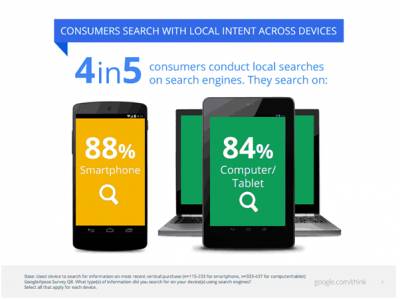Ag Voice | The Future of Mobile Search and Discovery
In just the last couple of years, smartphones have influenced the ways we search and shop on the go. From finding the nearest store, to getting the latest deals, locating food and coffee shops or buying movie tickets, mobile is fast emerging as the preferred means of search. According to a report by Google on how marketers can extend their relevance with search:
• 4 in 5 consumers use search engines to find local information
• Another recent report on consumer local search behaviours says, 88% of local searches on search engines are being conducted on Smartphones in the US
• 50% of consumers who conducted a local search on their smartphone visited a store within a day
Are brands and marketers doing enough for the mobile consumer connect?
With fast expansion of the mobile consumer market, marketers and brands must plan on effective mobile engagement ideas to give their users a positive, personalized experience to increase engagement, conversions and purchase intent.
One such company ZipDial tied up with Facebook and used its missed call feature for Facebook, an instant connect with the price conscious consumer in India and emerging markets. This experience then drives online-to-offline engagement that encourages the user to perform an action such as purchasing a product, watching a television show, etc.
Today, mobile users expect immediacy, relevance and easy access to information. Hyper-contextual content recommendation and service offerings reinforces such successful consumer interaction. Reducing friction and hops on multiple apps or browsers, consumers prefer a seamless and easy solution to finding what they need
Recently, Facebook announced its jump to this ‘next level of ad-tech’. A spokesperson for the company said: “With local awareness ads, businesses can quickly and easily find new customers by showing ads to groups of people who are near that business’s neighbourhood.”
Brands and marketers can now use location data to target users regionally or locally to help consumers make quick decisions in their mobile search moment. However, the future of contextual intelligence is not only in location, context and relevance but also in predicting the needs of the user and serving information even before a search is initiated. Building in-app capability to delight the consumer with dynamic moments of discovery is another big step in this direction. New opportunities lie in creating a predictive pattern to respond to a user’s need in real-time by offering relevant recommendations through need anticipation.
For example, searches for taxi booking, movie booking, weather, travel, weekend getaways, coupons and deals etc. are extensively used by mobile users every day. Contextual targeting might get results on the closest store location or the movie theatre playing latest movies, but what if there was a service or a platform that could predict your needs, serve relevant content, at the right place and in your exact moment of need? With hyper-context, the intent of the user to book the cab for the cinema at his local multiplex is identified as the movie date approaches and an offer given right when he dives into his mobile to make a booking. Add local language to the context and you get closer to understanding and implementing hyper-context.
In regions like APAC and LATAM, where English is not the primary user language, the relevance of hyper-context built on artificial intelligence models of the local language and usage will be a clear winner. Simplified experiences that help a user discussing weekend plans discover an adventure trail meet-up, friends Whatsapping on a wedding gift being delighted with a wedding gifting service, friends Facebooking on a latest trend being offered related content etc. The consumer is a key aspect of the hyper-context unlike just interest and context driven solutions out there. There is a hyper-moment in there for brands to help the consumer connect at his moment of need.
Hyper-contextually intelligent mobile services are bound to have major positive implications on mobile technology and services ecosystem. Prima Dona, VP Product Innovation at KeyPoint Technologies says, “It is all about the consumer. Platforms that intelligently collaborate with the consumer in their mobile moment of discovery and search opens up an exciting and user driven channel to serve, retrieve and consume content & service. Our research in this space has thrown up some interesting findings like how brand recall and deal adoption increases with engaging experiences at the point of user intent. Our studies show that consumers largely adopt simplified experiences that help them solve their mobile moment of need faster. ”
Hyper-contextual information discovery and delivery is a win-win situation for the users and the marketers. Building stronger consumer relationships, marketers can maximize revenues by optimizing deals and services recommendations, increasing customer engagement.
With new innovative platforms on the horizon, the future of hyper-contextual mobile services looks hyper-exciting to the consumers and marketers alike!
Image credit: google.com/think
Attributed to: Ms. Prima Dona - VP Product Innovation, IP, Business Strategy at KeyPoint Technologies








Share
Facebook
YouTube
Tweet
Twitter
LinkedIn